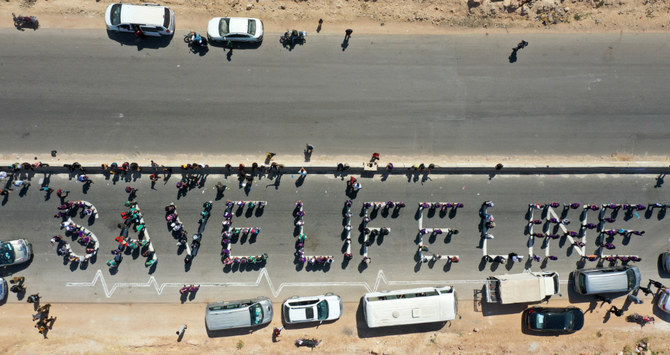NEW YORK: When the UN Security Council agreed to extend a cross-border humanitarian operation into Syria earlier this month, concerns were raised over the wording of the resolution as some considered it ambiguous.
Resolution 2585 stated the mandate for the Bab Al-Hawa crossing on the Syria-Turkey border had been extended for six months until Jan. 10, “with an extension of an additional six months, until July 10, 2022, subject to the issuance of the secretary-general’s substantive report.”
Linda Thomas Greenfield, the US permanent representative to the UN, was adamant that the US saw the resolution “being automatically renewed following the (secretary-general’s) report. No vote will be required and the council will work with the secretary-general’s office to ensure that once he puts his report on the table, that it will be accepted by all council members.”
However, in his first encounter with journalists since the vote took place, the charge d’affaires of the Russian Federation at the UN, Dmitry Polianskiy, quickly debunked the American interpretation and media reports that adopted it.
“This is not the case,” Polianskiy said. “Whether or not the mechanism will be prolonged for another half year, like what the ambassador said, is dependent on how transparent the secretary-general’s report will be. There are a lot of conditions in the text of the resolution. It is very significantly beefed up with a lot of things that the security council and the international community are supposed to do in the run-up to this possible prolongation in six months.
“So, there is no automatism in this part.”
The unanimous vote to extend the mandate for the transport of aid to Syria through a crossing on the border with Turkey came after Russia finally agreed to a compromise with the US.
It followed months of intransigence on the part of Moscow, which argued that all aid should be channeled through the regime in Damascus. Russia also blamed the humanitarian crisis in the war-torn country on international sanctions imposed on the regime of Syrian President Bashar Assad.
Polianskiy reiterated this position and said Moscow hoped to see “a dramatic increase in cross-line deliveries and in the efforts to assist in the reconstruction of Syria.”
Cross-line operations refer to internal shipments of aid from Damascus to rebel-held parts of the country, whereas cross-border aid is shipped directly to those areas by other nations.
“Our position is that the cross-border mechanism belongs to history,” Polianskiy said. “It was adopted when the Syrian government was not in control of its territories, and it goes contrary to the principles of humanitarian assistance, which call first for the consent of the receiving country. Syria refused cross-border aid from the beginning.
“Now, our international partners should prove that they are sincere in their pledges to us that they will work through cross-line deliveries as well. For the initial period, we will want (the latter) to supplement cross-border deliveries, for them to work as a single package because if it is about helping people living there, then it does not matter how you deliver humanitarian aid, cross-border or cross-line. But if you have political reasoning, yes this matters very much. So we think that political reasoning should not be (factored in) our decisions on Syria.”
The Russian envoy repeated his country’s claim that the economic suffering in Syria is a result of western unilateral sanctions and “coercive measures.”
“It is very hypocritical, on one hand, to increase the assistance to Syrians, and on the other hand, to keep unilateral sanctions and coercive measures,” Polianskiy said.
Russia continued to defend the Assad regime at the security council and called on nations to take part in the reconstruction efforts of the war-ravaged country. At the same time, Western council members and others reiterated that they will not support any reconstruction aid that benefits the regime absent progress in achieving the political reforms called for in Resolution 2254.
During his meetings in Moscow this week, Geir Pedersen, the UN special envoy for Syria, expressed hope that the common understanding seen in adopting the humanitarian resolution could be developed “into more of a unity when it comes to the political process.”
In order for that to happen, Pedersen said “we need to sit down together and discuss what all of us can bring to the table.”
Polianskiy said: “I do not know what magical solution Mr. Pedersen has to accommodate these concerns and how he will bring all the parties, including the government, to the negotiations table.
“Let us see. He is a very talented and experienced diplomat. We respect him very much. But so far, we think that the only working format is the constitutional committee which is taking place in Geneva. We hope there will be another meeting and we are trying to assist as much as we can in a settlement for Syria and to get up to speed with the constitutional committee.”
The Russian diplomat welcomed other countries’ efforts but only if they “proceed from the respect of territorial integrity and sovereignty in Syria. But the devil is in the details, so let us see what comes out of it.”
He added: “It is not that we want to monopolize some kind of negotiation track on Syria. We were from the very beginning advocating for a dialogue to find a solution. But the fact is there are certain states that still do not want to engage with the current Syrian government, which is legitimately recognized by the whole world.”
















